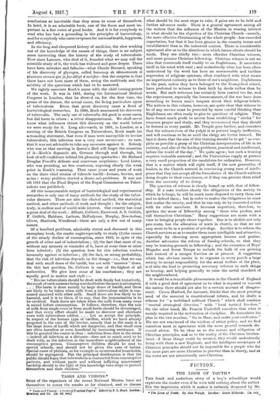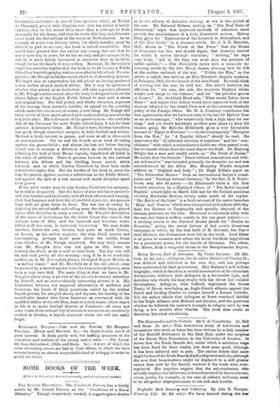FICTION.
THE LOOM OF YOUTH*
Toss frank and audacious story of a boy's schooldays would captivate the reader even if he were told nothing about the author But the impression which it makes is certainly deepened by Mr.
• The Loon of Youth, By Also Wauzb. London Grant Richards. tbs. nett
Hercombe's statement--in ono of those prefaces which, as Robert de Tiers said, persist while Empires reel—that the author is barely eighteen, that he left school little more than a year ago to train as a cadet for the Army, and that he wrote this long and elaborate novel amid the distractions of the camp at Berkhamsted. As an example of precocious literary talent, for which heredity must be allowed in part to account, the book is indeed remarkable. One would have guessed that the author was young, but not that he was a mere boy in years, for he has an easy and picturesque style, end be is more keenly interested in character than in incident, though ho Iles the knack of story-telling. However, Mr. Seeeombe's surprising assertion implies that the book is, to all intents, a Public School boy's autobiography, written soon after he left school. We con- gratulate Mr. Waugh on his first novel, which is of absorbing interest. We ought also to congratulate his old school on having produced a now author of such marked ability. But it may be questioned whether that school, as an institution, will take a genuine pleasure in Mr. Waugh's achievement, since the story is designed to show the abject failure of the English Public School to deal with a clever and original boy. The half pitiful, and wholly relentless, exposure of the average form master's inability to appeal to the youthful minds under his care is not, of course, a new thing. Mr. Waugh will think better of those much-abused and much-enduring men when he is a little older. His indictment of the games system—the veritable Ark of the Covenant for most Public School boys, if not for their parents—is intensely bitter. Mx. Waugh's here, Gordon Caruthers, was good, though somewhat unequal, at both football and cricket. He took a lively interest in games, and none at all in class-work or examination.). Yet he and his friends never tired of railing against the games fetish; and almost his last act before leaving school was to arrange a debate in which an obedient majority, following the lead of their House captain, repudiated all belief in the value of athletics. There is genuine humour in the contrast between this debate and the thrilling house match which followed, and in which Gordon Caruthers by sheer luck made a wonderful eighty-five. But the burden of the book is, none the less, the protest against excessive athleticism in the Public School, and against the lack of a real mental and moral discipline apart from games.
If the adult render were to take Gordon Caruthers too seriously, he would be disquieted. But the father of sons will know perfectly well that Gordon and his friends, with all their idleness and cunning, their bad language and their fits of youthful depravity, are genuine boys with no great harm in them. The war has of course, by depleting the school staffs and calling away the older boys, played havoc with discipline in many a school. Mr. ill'augh's description of the wave of enthusiasm for the Cadet Corps that came in the autumn term of 1914, and the lassitude and boredom which followed all too soon, is extremely interesting. We may doubt Whether, before the war, Gordon had quite so much liberty, or license, as the author suggests ; the wise Chief, remote and awejnapiring, perhaps knew more about the middle forms than Gordon, or Mr. Waugh, suspected. We may fairly assume that Mr. 1Vaugh's hero was not quite so idle, when he reached the Sixth, as he is said to have boon. The boy who will sit and read poetry all the morning--even if lie is so resolutely modern as, in Mr. Seceombe's phrase, to regard Rupert Brooke as " a mellow classic" and Mr. Minefield as of the old school—may be excused by a shrewd master from the conventional lessons, since he is a very rare bird. The main thing is that we have in Mr. Waugh's clever story a picture of the tweatieth.century schoolboy by himself, and an extraordinarily interesting picture it Ls His hesitations between the aupposed alternatives of athletics and literature, his bouts of black pessimism varied by the wildest boyish pranks, his mingled daring and shyness, his worship of the unorthodox master who loves literature as contrasted with his qualified dislike of the old Blue, heed of a rival house, whose object in life is to make football flourish at Fernhurst—all these and other traits of the natural boy of sixteen or seventeen are excellently studied in Gordon, a boyish character whom one will not easily forget.



























 Previous page
Previous page